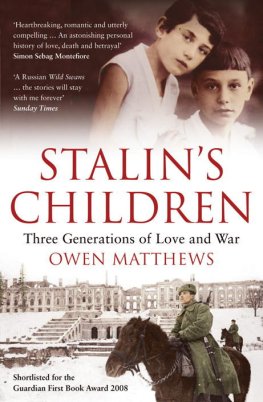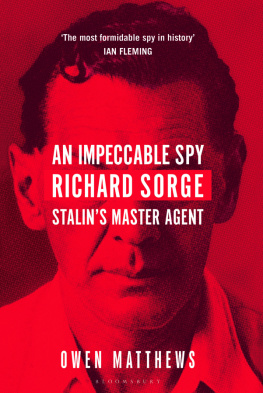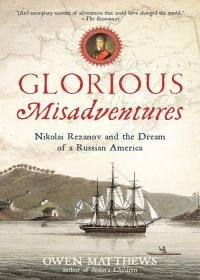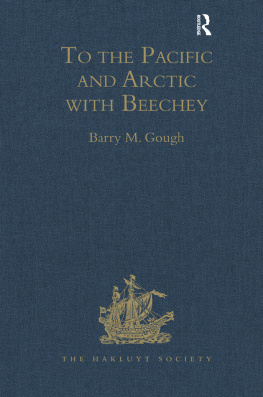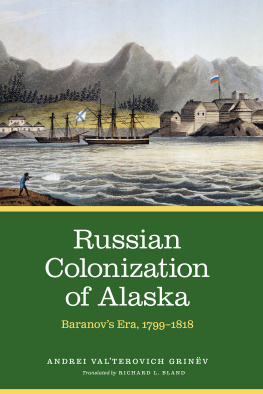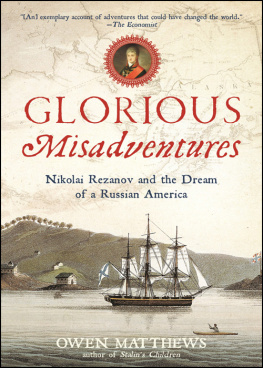
To Xenia, Nikita and Teddy
Like all of us sinners, General B. was endowed with many virtues and many defects. Both the one and the other were scattered through him in a sort of picturesque disorder. Self-sacrifice, magnanimity in decisive moments, courage, intelligence and with all that, a generous mixture of self-love, ambition, vanity, petty personal ticklishness, and a good many of those things which a man simply cannot do without.
Nikolai Gogol, Dead Souls
Contents


O, Russian Columbuses, scorning a grim Fate;
Between the mounts of Ida will open a new path to the East;
And we will plant our State on Americas shores...
Mikhail Lomonosov, Russian Columbuses , 1747
This Mister Rezanov was a dynamic fellow, hot tempered, a dedicated scribbler, a talker, with a head more inclined to making castles in the air in his study than to making great deeds come true in the world.
Captain Vasily Golovnin
On a warm spring evening in May 1806, a betrothal was celebrated in the tiny fort of San Francisco, the northernmost outpost of Spains American empire. The single-storey adobe governors house, with its sweeping views over the bay, was decorated with wildflowers.
The bride-to-be was the governors fifteen-year-old daughter, Doa Mara de Concepcin Marcella de Arguello, a bright-eyed angel His name was Nikolai Petrovich Rezanov, widower, a nobleman of the Russian Empire and master of a fur trading empire that extended from the Urals to Alaska. He wore the dark green uniform of a chamberlain to Tsar Alexander I. At his throat was the white cross of a commander of the Order of Malta, worn by the favourites of Alexanders recently murdered father, Tsar Paul. On his chest was the diamond-encrusted star of the Order of St Anne first class, a sign of the Russian emperors high favour.
Rezanov was a wealthy man, with powerful friends at court. But here in California he was also a desperate man, with madness hatching within him. Three years at sea had battered him. He had failed utterly in the primary task with which his emperor had entrusted him: an embassy to Japan to open trade with the hermit nation. He had become morbidly conscious of his own status and dignity, and donned his decorations like armour. Rezanov had also become volatile, a bully and a martinet. He wept when making patriotic toasts in honour of the emperor and played lyrical pieces on his violin, yet he did not hesitate to tell his fellow officers to go screw their mothers. He had spent much of the voyage furiously bickering, scheming and denouncing his colleagues, and his shipmates returned the favour by devoting pages of their diaries to castigating him. They called him an ignoramus, an arch rascal but some of them would and did follow him to the end of the earth.
Rezanov was also a charmer, a skilled diplomat and a gambler. California was the ultimate point in his long journey from the Russian imperial court, where he had spent much of his career, to the remotest wildernesses in the world. And it was here, on the barely explored north-east coast of North America, that he hoped to find redemption in the form of a great imperial coup that would restore him to the favour of the Tsar. And perhaps personal redemption too, in the form of a new life with Conchita, the beauty of the Californias.
The brides father, Don Jos Dario Arguello, commander of the San Francisco garrison, was a man from a very different world from Rezanovs. He had been born a peasant in the pueblo of Santiago de Quertaro in modern-day Mexico. He was tall but dark-skinned, and through intelligence and determination he had risen through the ranks of the Spanish dragoons. As a twenty-eight-year-old sergeant he showed his mettle by taking command of a party of colonists after the murder of their officer and leading them to found a new settlement named for Nuestra Seora la Reina de los ngeles. It was a humble little place, one of the poorest missions in California, but Don Jos Dario doubtless hoped that his settlement of Los Angeles might amount to something one day. Arguello was now fifty-three years old, a trusted servant of the empire of New Spain, a pious man deeply attached to his wife and thirteen surviving children.
Arguello clearly had mixed feelings about the proposed marriage. Rezanov had burst in upon his familys quiet lives less than a month before in a battered American-built brig, his breath foul from scurvy and starving in his finery. In the intervening weeks he proceeded to turn Arguellos carefully ordered world on its head. First the Russian busied himself with making friends with the local Franciscan friars and encouraging them to break the Spanish empires ban on trade with the outside world. He flirted with Arguellos eldest daughter perfectly respectably, always with a duenna present. Then, scorning all objections of rank, faith and politics, he proposed marriage to Conchita and the girl had immediately accepted. Though they had no common language other than Rezanovs Frenchified, improvised Spanish, the Russian had clearly made an impression.
Of course he had. Rezanov was a professional courtier: he knew how to dazzle, and to charm, and to make himself indispensable. He had spent much of his life in St Petersburg, Europes most glittering court now that the French one at Versailles has been so rudely decapitated. He was by far the most impressive and worldly man that Conchita had ever met. Small wonder that she enthusiastically agreed to the Russians offer, even though it meant she would be taken to St Petersburg, half a world away. But to Arguello the betrothal meant that he would most probably lose his daughter for ever. Nor was Conchitas suitor even a Roman Catholic.
Perplexed he might be by his fast-taking future son-in-law, but Comandante Arguello was determined to put on a good show for an event as momentous as his eldest daughters engagement. Dancing was arranged in the modest hall of his residence. A band of soldiers was assembled from among the forts forty-strong garrison, and they played the barrego , a courtly Spanish minuet, on violins and guitars. The Russians took their turn by playing English country dances. Rezanov performed on his fiddle and danced with his dark-eyed Conchita.
She was lively and animated, had sparkling love-inspiring eyes, beautiful teeth, pleasing and expressive features, a fine form, and a thousand other charms, yet her manners were perfectly simple and artless, wrote Rezanovs German doctor and the expeditions natural historian, Georg von Langsdorff. For dinner the party was treated to an excellent soup of pulse and vegetables, with roasted fowls, a leg of mutton, different vegetables dressed in various ways, salad, pastry, preserved fruits and many very nice sorts of food, the produce of the dairy... the wine, which was the production of the country, was but of an ordinary quality, but was succeeded by super-excellent hot chocolate.
Bullfights had been arranged for the next day, and bear-baiting. Arguello dispatched eight soldiers at dawn to find the required wild animal, and they returned at dusk dragging a large brown bear, its limbs bound and carried on a bier of stretched ox hide. Langsdorff observed the bear splash about in the water to cool himself... No-one dared venture near him for he growled, gnashed his teeth and seemed very indignant at the treatment he received. None of the Russians was tactless enough to comment that their hosts were proposing to bait their national animal to death the following day. The connection certainly did not occur to Arguello, as artless in his manners as his daughter. But in any case the poor bear died in the night, so in the end the company had to make do with traditional Spanish bulls instead.
Next page



